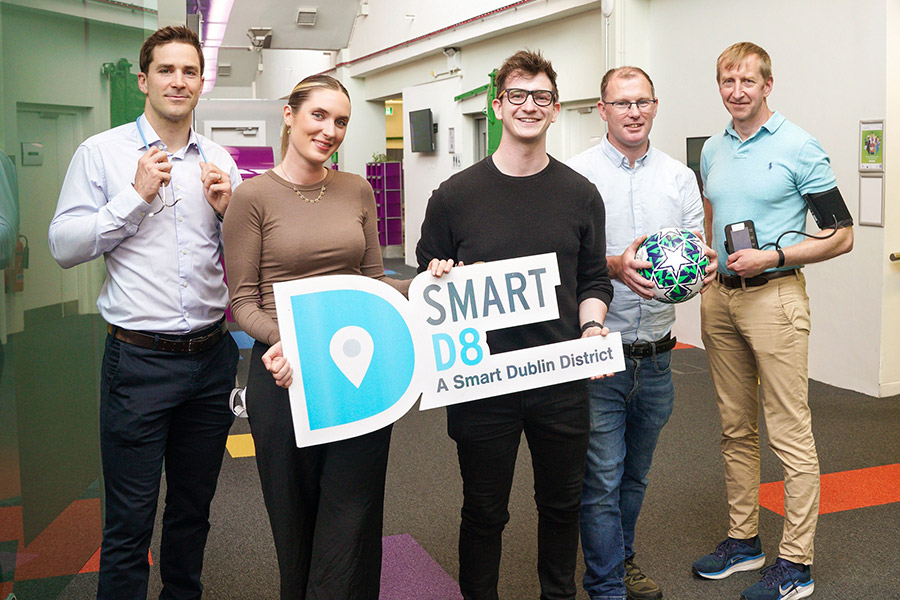Smart D8, the Dublin 'smart district' aiming to address community health and wellbeing, has announced three new pilot projects.
The initiatives will centre on accelerating cancer detection using AI, driving positive conversations around men's health through community football, and supporting remote heart health for patients with heart failure conditions.
The announced projects come as Smart D8 prepares to mark five years since its launch.
Through pilot calls, local workshop activities and engagement with existing community groups, Smart D8 has reached over 18,500 people living and working in Dublin 8, more than 40 per cent of its 45,000 population.
Smart D8 is led by The Digital Hub, Dublin City Council, St James’s Hospital and Smart Dublin.
Partners include the Tyndall National Institute, St Patrick’s Mental Health Services, Trinity College Dublin, Trinity Translational Medicine Institute, National College of Art & Design, Guinness Enterprise Centre, Health Innovation Hub Ireland and the HSE in this unique collaborative initiative.
The Smart D8 pilot programmes selects a number of health and wellbeing-focused initiatives each year following a competitive application process.
Selected projects are supported with community engagement and funding as they are demonstrated in Dublin 8 for a six-month period.
After this period, they are evaluated to verify the potential to scale their innovations for long-term population health and wellbeing impacts in the area and beyond.
The three projects that will be implemented this summer are:
Early-Stage Cancer Detection by the RCSI University of Medicine & Health Sciences: This project, run by the PRiCAN research group, aims to support expedited cancer diagnoses through an AI-powered digital scribe tool, which will assist in diagnostic consultations in Centric Health GP practices in Dublin 8.
The tool will support GPs by reducing administrative burden and monitoring conversations with patients for subtle symptom patterns potentially linked to cancers with the aim of prompting earlier investigation and diagnosis.
Football Cooperative by Football Cooperative CLG: This project, led by Steven O’Connell, aims to engage men in positive health behaviours through weekly pick-up football games, encouraging conversations about men’s overall physical, mental and social health.
Backed by South-East Technological University (SETU), the programme has already demonstrated a social return of €17.60 for every €1 invested and will aim to co-develop a robust outcome framework to enable national scaling through partners, including the FAI and Local Sports Partnerships.
Smart Heart: Heart Failure Care in the Community by patientMpower and in partnership with St James’s Hospital Heart Support Unit: Led by Eamonn Costello and Eimear Kelly, this project involves the remote monitoring of individuals living with heart failure, a condition that affects 2 per cent of Ireland’s population.
Patients will receive connected devices that transmit blood pressure and weight data to clinicians in real-time, enabling the trial of a scalable model of community-based chronic care.
"Each year, the quality of applications for Smart D8 is increasing, which is a reflection of the interest and impact that the programme and these initiatives are creating," said Jack Lehane, ecosystem manager at Smart D8.
"The three selected projects focus on key areas centred on population health and wellbeing, cemented by innovation and scalability.
"We look forward to supporting these projects over the coming six months and seeing the positive impact that they generate with the Dublin 8 community and wider areas to scale.”
Ana Coughlan, Smart D8 community coordinator, added: “Community engagement is at the heart of Smart D8, and we’re excited to see how people living and working in Dublin 8 can participate in the three new pilot projects for 2025.
"Over the past five years, Smart D8 has reached more than 40 per cent of the local population — a milestone we’re proud of as we continue to support health and wellbeing innovation in the area.
"These new pilots are an opportunity to respond to local health challenges in meaningful ways, where improved health and wellbeing can become more embedded into everyday life in Dublin 8 and our wider communities.”
Smart D8 has supported a total of 16 projects to date, including Kids Speech Labs, which filled gender and cultural data gaps for early-intervention speech and language screening.

There was also Menopause and the City, a menopause education initiative to empower women and their family and friends to manage menopause symptoms, and MoveAhead, which pioneered motion-analytics technology to improve children’s movement skills and enhanced the skills of more than 500 Dublin 8 schoolchildren.
(Pic: Supplied)











